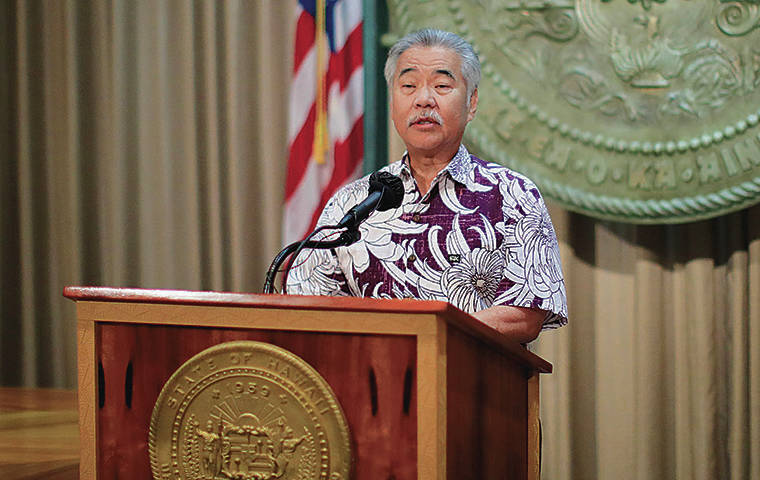Gov. David Ige to veto budget, teacher bonuses

JAMM AQUINO / JAQUINO@STARADVERTISER.COM
Gov. David Ige announced his intention Monday to veto 28 bills passed during the most recent session of the Legislature at a news conference at the state Capitol.
Gov. David Ige announced Monday his intention to veto up to 28 bills passed by the legislature this year, including the state budget, teacher bonuses and a requirement to disclose the name of public schools with COVID-19 cases.
The improved economic projections for the state, and new federal guidance restricting the use of COVID-19 relief money were the main reasons Ige cited for the large number of possible vetoes.
“The Council on Revenues has increased the general fund revenue forecasts since the legislature concluded by over $6 billion dollars over the seven year financial period,” Ige said at a Capitol news conference. “Because of this, we definitely no longer need some of the extraordinary revenue measures that have been proposed.”
The economic improvements are attributed to the influx of visitors returning to Hawaii and the substantial federal relief money through the federal American Rescue Plan Act and the Coronavirus Response and Relief Supplemental Appropriations Act.
The guidance to states on how to spend the federal funds was released after this year’s Legislative session ended. Some of the bills passed by lawmakers would spend federal dollars in ways not allowed, Ige said.
States are not allowed to use federal relief funds to pay down debt obligations or to pay for programs that have federal fund matching requirements. The state’s budget, House Bill 200 allocated $314.9 million in federal funds for those purposes. Ige’s intention to veto is meant to address the issue.
Don't miss out on what's happening!
Stay in touch with breaking news, as it happens, conveniently in your email inbox. It's FREE!
Another significant measure that could be eliminated is HB 613, which would have given teachers a one-time $2,000 bonus. Ige said the main reason for considering the veto was due to federal guidance on the use of relief funds. The guidance directed education departments across the country to develop flexible plans with engagement of stakeholders to address learning loss. Ige explained that with this bill, that did not happen. He also would not be pursuing any other ways to implement the bonuses for teachers.
“We actually concluded negotiations with the teachers union,” he said. “We will not be providing a teacher’s bonus at this time.”
Ige is also considering a measure that would have required the state Department of Education to publicly disclose COVID-19 cases at specific schools, currently they disclose cases by complex area. However, he believes it could be an invasion of privacy, especially in smaller communities.
“When it comes to disclosure of health information, and especially information about our students, we are very careful not to violate the student’s privacy,” he said.
“The concern that we had is that it was very specific, and especially in rural schools, or some of the smaller schools all across the state, you could identify our students by exactly who they are if we were to identify the school.”
Ige also intends to veto HB 862, which would make significant changes to the Hawaii Tourism Authority, eliminated the distribution of the state’s Transient Accommodations Tax to counties and allowed counties to levy an additional local hotel tax.
House Speaker Scott Saiki said House members would meet this week to discuss the governor’s intended veto list.
“The Governor has not made his rationale for vetoes clear in his written notice,” Saiki said in a statement.
“We hope that he will provide further rationale in the next few days. At that time, we will decide whether to override any vetoes.”
Ige’s deadline to make his final veto decisions is 45 days after the end of the legislative session, which is on July 6. Lawmakers can come back on that day to override his veto on measures through a two-thirds majority vote.
The governor also has the option of proposing an amended version of a bill, and lawmakers can approve the amendments with a simple majority. The governor must then sign the amended version in 10 days for it to become law.
Ige acknowledged that his vetoes could lead to holes in the state budget. If the budget holes left by the vetoes are not addressed through the amendment process, the governor can call the legislature back for a special session. Then lawmakers would have to reintroduce bills and the measures would have to go through the legislative process again, including committee hearings and votes in both chambers. Both the Senate and the House can also call a special legislative session through a two-thirds majority vote.
Ige can only veto the measures that he listed Monday, all others will become law with or without his signature.
ON THE LIST
Bills Ige intends to veto 28 bills, including:
>> House Bill 200: The state budget bill.
>> House Bill 613: $2,000 bonus for teachers.
>> Senate Bill 811: Disclose schools with COVID-19 cases.
>> House Bill 862: Removes Hawaii Tourism Authority’s dedicated funding, eliminates the distribution of the state’s Transient Accommodations Tax to counties and allows counties to levy an additional local hotel tax.



